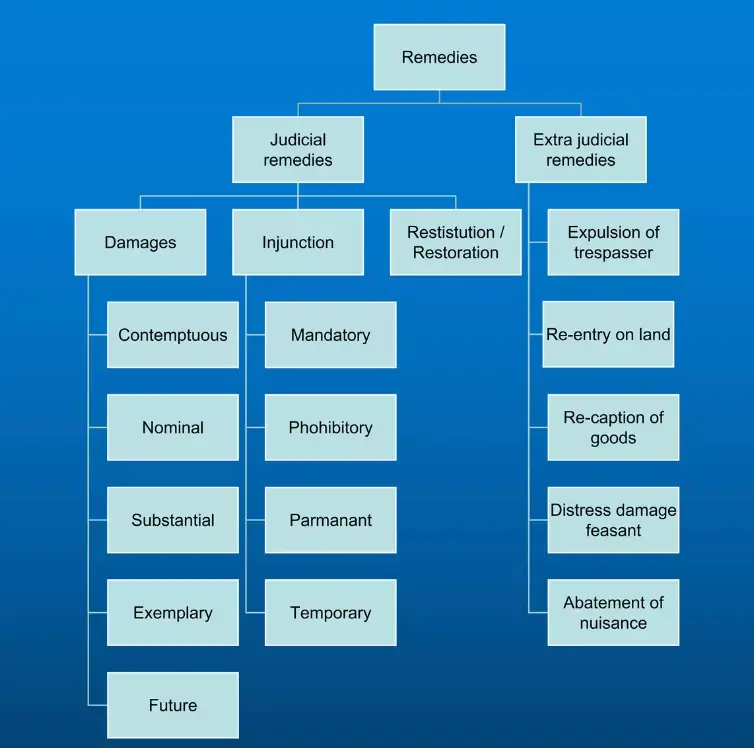Introduction
When someone infringes on your rights, tort law provides various remedies to help restore your position. These remedies are designed to address the harm caused and offer a form of justice. Let’s explore the different types of remedies available in tort law and how they function.
Types of Legal Remedies in Tort Law

Judicial Remedies
Judicial remedies are those provided by courts to the aggrieved party. They are the formal ways in which the legal system addresses a tort and include:
Damages
Damages refer to monetary compensation paid to the injured party to cover the loss they have suffered. The main goal is to restore the plaintiff to the position they were in before the tort occurred. The types of damages include:
- Contemptuous Damages: Awarded to show disapproval when the plaintiff is partly at fault.
- Nominal Damages: Given when a legal right is infringed without significant loss.
- Substantial Damages: Compensate for the actual loss suffered by the plaintiff.
- Exemplary/Punitive Damages: Punish the defendant for egregious conduct and deter future wrongdoing.
Damages can also be categorized as:
- General Damages: Cover direct losses linked to the wrongful act, such as physical pain.
- Special Damages: Require proof of specific losses, like medical expenses or lost income.
The amount awarded depends on the case’s facts and circumstances, as determined by the court.
Donoghue v Stevenson (1932) – This case established the principle of negligence and awarded damages for the harm caused by a defective product, setting a precedent for substantial damages in tort.
Injunction
An injunction is a court order requiring a party to do or refrain from doing a specific act. This remedy aims to prevent further harm or rectify a wrongful act. Injunctions can be:
- Temporary (Interlocutory): Granted during the case to maintain the status quo and prevent further damage.
- Permanent (Perpetual): Issued as a final decree, stopping the defendant’s wrongful act indefinitely.
- Mandatory: Compels a party to perform a specific act to rectify the harm caused.
- Prohibitory: Stops a party from continuing a wrongful act.
Situations Where Injunctions Are Granted:
- Government interference with lawful acts.
- Danger of property damage.
- Unjust removal of tenants.
- Continuing nuisances.
- Trademark or copyright infringement.
Situations Where Injunctions Are Not Granted:
- Preventing court cases.
- Legislative actions.
- Criminal cases.
- Breach of non-enforceable contracts.
- Acts not clearly constituting a nuisance.
American Cyanamid Co v Ethicon Ltd (1975) – In this case, the court discussed the criteria for granting a temporary injunction, emphasizing the balance of convenience and irreparable harm as crucial factors.
Specific Restitution of Property
This remedy involves the return of the plaintiff’s property that was wrongfully taken or detained. It aims to restore the original condition rather than providing monetary compensation.
Extra-Judicial Remedies
Extra-judicial remedies are actions taken by the injured party without court intervention. These remedies include:
Expulsion of Trespasser
A property owner can use reasonable force to remove a trespasser from their property.
Re-entry on Land
The rightful owner can remove a trespasser and re-enter their property, using reasonable force if necessary.
Re-caption of Goods
The owner of goods can reclaim their property from someone who has unlawfully taken it, using reasonable force if required.
Abatement
A person can remove a nuisance (e.g., cutting overhanging branches) after notifying the responsible party.
Distress Damage Feasant
If someone’s animals damage your property, you can retain the animals until the owner compensates you for the loss.
Eaton v Bason (1853) – This case exemplifies the right to use reasonable force for the expulsion of trespassers and re-entry on land, setting a precedent for lawful self-help remedies in tort law.
Conclusion
Understanding the remedies available in tort law is crucial for protecting your rights and seeking justice when they are infringed. Tort law provides diverse options to address wrongful acts and restore your position, whether through judicial remedies like damages and injunctions or extra-judicial remedies such as expelling a trespasser or reclaiming goods. By being aware of these remedies, you can take appropriate legal action to ensure that any harm done to you is adequately addressed and rectified.
FAQ’s About Remedies in Tort
Q: What is the difference between compensatory and punitive damages in tort law?
A: Compensatory damages reimburse actual losses to the plaintiff, while punitive damages punish the defendant for severe misconduct and deter future wrongdoing.
Q: When can a court grant a temporary injunction? A:
A court grants a temporary injunction to maintain the status quo during a case, preventing further harm until a final decision, typically when there’s a strong case, balance of convenience, and risk of irreparable harm.
Q: What are extra-judicial remedies in tort law?
A: Extra-judicial remedies are actions like expelling trespassers, reclaiming goods, abating nuisances, and detaining damaging animals, taken by the injured party without court involvement to address wrongdoing.
Also Read: Joint Tortfeasors | Everything You Need To Know
Reference: blog.ipleaders.in